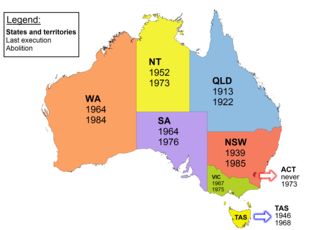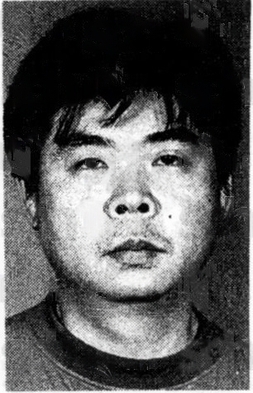Capital punishment, also known as the death penalty and formerly called judicial homicide, is the state-sanctioned practice of killing a person as a punishment for a crime, usually following an authorised, rule-governed process to conclude that the person is responsible for violating norms that warrant said punishment. The sentence ordering that an offender be punished in such a manner is known as a death sentence, and the act of carrying out the sentence is known as an execution. A prisoner who has been sentenced to death and awaits execution is condemned and is commonly referred to as being "on death row". Etymologically, the term capital refers to execution by beheading, but executions are carried out by many methods, including hanging, shooting, lethal injection, stoning, electrocution, and gassing.
Capital punishment is a legal penalty in China. It is applicable to offenses ranging from murder to drug trafficking. Executions are carried out by lethal injection or by shooting. A survey conducted by TheNew York Times in 2014 found the death penalty retained widespread support in Chinese society.
Capital murder refers to a category of murder in some parts of the US for which the perpetrator is eligible for the death penalty. In its original sense, capital murder was a statutory offence of aggravated murder in Great Britain, Northern Ireland, and the Republic of Ireland, which was later adopted as a legal provision to define certain forms of aggravated murder in the United States. Some jurisdictions that provide for death as a possible punishment for murder, such as California, do not have a specific statute creating or defining a crime known as capital murder; instead, death is one of the possible sentences for certain kinds of murder. In these cases, "capital murder" is not a phrase used in the legal system but may still be used by others such as the media.

Capital punishment in Singapore is a legal penalty. Executions in Singapore are carried out by long drop hanging, and usually take place at dawn. Thirty-three offences—including murder, drug trafficking, terrorism, use of firearms and kidnapping—warrant the death penalty under Singapore law.

Stanley Prison is one of the six maximum security facilities in Hong Kong.

Capital punishment is a legal penalty in Taiwan. The long list of capital offences, for which the death penalty can be imposed, includes murder, treason, drug trafficking, piracy, terrorism, and especially serious cases of robbery, rape, and kidnapping, as well as for military offences, such as desertion during war time. In practice, however, all executions in Taiwan since the early 2000s have been for murder.

Capital punishment in Australia has been abolished in all jurisdictions since 1985. Queensland abolished the death penalty in 1922. Tasmania did the same in 1968. The Commonwealth abolished the death penalty in 1973, with application also in the Australian Capital Territory and the Northern Territory. Victoria did so in 1975, South Australia in 1976, and Western Australia in 1984. New South Wales abolished the death penalty for murder in 1955, and for all crimes in 1985. In 2010, the Commonwealth Parliament passed legislation prohibiting the re-establishment of capital punishment by any state or territory. Australian law prohibits the extradition or deportation of a prisoner to another jurisdiction if they could be sentenced to death for any crime.
Capital punishment is a legal penalty in Malaysian law.
Yong Vui Kong is a Malaysian who was sentenced to death in Singapore for trafficking more than 15 grams of heroin in 2007. His sentence was reduced to life imprisonment and caning as a result of Singapore's amendments to the Misuse of Drugs Act.

Capital punishment in Macau was formally abolished in 1976 and reiterated in the Penal Code of Macau in 1995.
Death with reprieve is a criminal punishment found in chapter 5, sections 48, 50 and 51 of the criminal law of the People's Republic of China. It is a two-year suspended sentence where the execution is only carried out if the convicted commit further crimes during the suspension period. After the period the sentence is automatically reduced to life imprisonment, or to a fixed-term based on meritorious behavior. The reprieve is integrated into the sentence, unlike a pardon which occurs after the sentence.
Capital punishment is not a legal penalty in Samoa. The death penalty was used in the colonial era, but the practice had ceased by the time of independence in 1962, with death sentences being commuted to life imprisonment, and it was formally abolished in 2004. The last execution was carried out in 1952.

Nazeri bin Lajim, full name Nazeri bin Lajim Hertslet, was a Singaporean drug trafficker. Prior to his arrest in April 2012, Nazeri went to prison several times for drug consumption and several other drug offences, and was said to be addicted to drugs at age 14. Nazeri and his Malaysian accomplice were both brought to trial and found guilty five years later on 8 August 2017.

Angel Mou Pui Peng was a 25-year-old female Macau national executed in Singapore for drug trafficking.

Lau Chi Sing was a 23 year old male Hong Kong national executed in Singapore for drug trafficking. He was the first Hongkonger to be executed in Singapore since its independence and also the first drug mule to be sentenced to death for trafficking narcotics via Changi Airport.

Cheuk Mei Mei was a 29-year-old woman from Hong Kong who was executed in Singapore for drug trafficking. Cheuk was the first foreign woman convicted of a drug offence in Singapore to be executed.

Tong Ching Man was a 25 year old female Hong Kong national executed in Singapore for drug trafficking.

Poon Yuen Chung was a 22-year-old female Hong Kong national executed in Singapore for drug trafficking.

Elke Tsang Kai-mong was a 30 year old female Hongkonger who was executed in Singapore after being charged and found guilty with smuggling over 4 kg of diamorphine into the country. Tsang, the daughter of a high-ranking Hong Kong police officer, was caught on 26 July 1992 at Changi Airport with 22 packets of diamorphine stuffed inside the inner lining of her two jackets. Despite putting up a defence that she had committed the crime out of fear for her life, Tsang was nonetheless found guilty of capital drug trafficking after a six-day trial and sentenced to death on 19 October 1993. She was one of the few women from Hong Kong who faced the gallows for drug offences in Singapore back in the 1990s. Tsang was hanged on 16 December 1994 after losing her appeal.

Daniel Chan Chi-pun was a Hongkonger charged with trafficking 464 grams of heroin on 20 November 1990. Chan was said to have smuggled the drugs in return for money to pay for the treatment to cure his son's blindness. Chan, however, denied knowing that he was carrying heroin and even claimed it was someone else who passed the vest to him at the airport before he was arrested.












